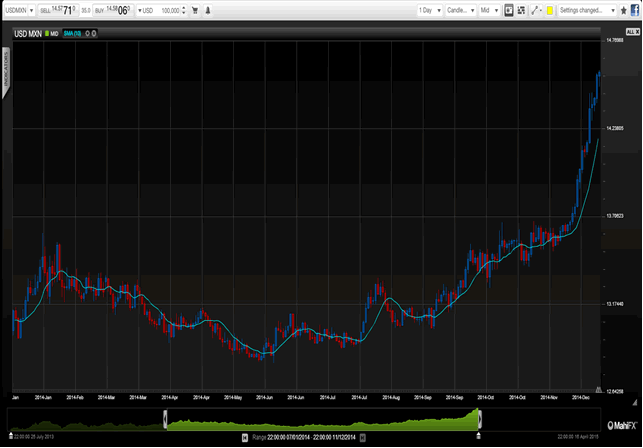USD Strength Could Trigger Emerging Market Crisis Sending it Even Higher
Currencies / US Dollar Dec 12, 2014 - 02:48 PM GMTBy: MahiFX
It seems impossible for the USD to move in any right direction for emerging markets with it blamed for causing inflation when it falls and now it’s the culprit for a potential crisis in some developing countries which have borrowed in the US currency. The bad news for them is that the greenback is likely to carry on strengthening.
Changes in US monetary policy, the increasingly faster growing economy and rapid jobs creation all suggest that the USD may have embarked on a long-term secular bull market. The US dollar index has already taken out 2009-2010 highs with 2005-2006 levels potentially in the cross hairs.
Nonetheless, the very rapid pace of the USD rise since July does suggests a period of consolidation should be in store at some point fairly soon.
For emerging market countries there is also the issue of plunging commodity prices, meaning that for many of them revenues are falling, such as for Russia, the Gulf countries, Nigeria and Mexico. Commodity producers that borrowed in USD are likely to find it harder to repay those debts.
This is of particular concern to the Bank of International Settlements, which noted that USD cross-border lending has hit $9 trillion with emerging market countries, such as Brazil, Mexico and Mexico being among the borrowers.
Lift-off for USD/MXN – just the beginning?

US rate rises may have to be delayed
The last thing the world needs is another financial crisis, even a relatively minor one – but if one were to erupt, say involving a number of emerging market countries, then initially at least, the USD would rally further benefiting from a flight to safety.
However, the resilience of emerging market borrowers could be really tested if the US Federal Reserve started raising interest rates sooner than anticipated by the markets. A round of 'risk off' sentiment would send stock markets and commodities plunging raising the spectre of deflation, making the Fed's task of normalising monetary a lot more complicated.
This would also have implications for the other major central banks, which are concerned about deflationary forces or manage 'risk' currencies. GBP, EUR, AUD, CAD, NZD would all likely cede ground to the USD in a risk-off environment.
Emerging market crises have been a fairly constant feature of the global economic landscape for decades. If one were to erupt this time it would likely involve corporates rather than countries themselves. This might mean it would be less severe than previous episodes, such as the Latin American debt crisis of the 1980s or the Asian crisis of the 1990s. However, that debt may well be held by developed country financial institutions, which would be another source of worry.
Resolving the more severe emerging market crises required action by the US authorities and any repeat could see US interest rates rises delayed, in the medium term that would at least take some steam out of the USD.
For the time being emerging market currencies tied to commodities remain volatile and look good candidates for short trades following upward entrancements against the USD. Q1 of the New Year could be a particularly testing time for these currencies when traders and investors return to make longer term assessments of the markets.
By Justin Pugsley, Markets Analyst MahiFX
Follow MahiFX on twitter
For media enquiries contact: Michele McDermott-Fox, The Top Floor Agency.
T: +44(0)1625 502 545 |M: +44 (0)7729 501 369 | E: michele@thetopflooragency.com
About MahiFX
MahiFX is headed by David Cooney, former global co-head of currency options and e-FX trading at Barclays Capital and responsible for the award winning e-commerce platform BARX and Susan Cooney, former head of e-FX Institutional Sales in Europe for Barclays Capital. Operating as a market maker, MahiFX provides traders direct access to institutional level execution speeds and spreads through its proprietary-built fully automated pricing and risk management technology, lowering the cost of retail forex trading.
MahiFX global operations are headquartered in Christchurch, New Zealand with offices in London, UK with development and support teams in both locations for 24 hour service. The company is regulated by The Australian Securities and Investments Commission (ASIC), Australia’s corporate, markets and financial services regulator.
© 2014 Copyright MahiFX - All Rights Reserved
Disclaimer: This material is considered a public relations communication for general information purposes and does not contain, and should not be construed as containing, investment advice or an investment recommendation, or an offer of or solicitation for any transactions in financial instruments. MahiFX makes no representation and assumes no liability as to the accuracy or completeness of the information provided.
The use of MahiFX’s services must be based on your own research and advice, and no reliance should be placed on any information provided or comment made by any director, officer or employee of MahiFX. Any opinions expressed may be personal to the author, and may not reflect the opinions of MahiFX, and are subject to change without notice.
© 2005-2022 http://www.MarketOracle.co.uk - The Market Oracle is a FREE Daily Financial Markets Analysis & Forecasting online publication.



